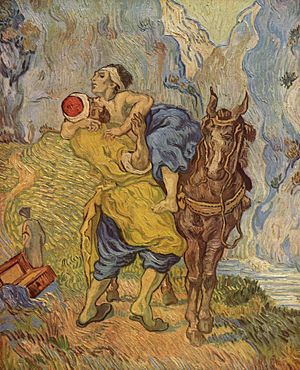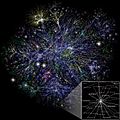Conscience facts for kids
Conscience is like an inner guide or a feeling that helps you know the difference between right and wrong. It's that little voice inside your head that tells you if something you're about to do, or have done, is good or bad.
When you do something that goes against what you believe is right, your conscience might make you feel bad or regretful. This feeling is called remorse. But when you do something good and honest, your conscience can make you feel proud and at peace. People often call this feeling "integrity" or "rectitude."
Conscience also helps you decide what to do before you act. It's like a moral compass that points you in the right direction. For a long time, thinkers have wondered if conscience is purely about logic or if it's more about feelings. Many people describe it as a "voice within" or an "inner light."
Contents
What is Conscience?
Conscience is a very personal thing. It's about your own sense of what is right and wrong. While there isn't one single definition everyone agrees on, most ideas about conscience involve a few key parts:
- It helps you make ethical decisions. This means deciding what is morally good or bad.
- It can make you feel certain emotions, like guilt or peace, based on your actions.
- It guides your behavior and choices.
Different Ways People See Conscience
People from different backgrounds and beliefs often think about conscience in slightly different ways.
Religious Views
Many religions believe that conscience is a gift from a higher power or a connection to a divine moral law. For example, some religions teach that conscience is how God speaks to people, guiding them to do good. It's seen as a way to understand and follow religious rules and teachings.
Secular Views
Secular views are ideas that are not based on religion. From this viewpoint, conscience is often seen as something that develops within a person as they grow up. It's shaped by their family, friends, culture, and experiences. It's about learning what society considers right and wrong, and then making those ideas your own.
Philosophical Views
Philosophers are people who study big ideas about life and knowledge. They have debated for centuries about what conscience truly is. Some philosophers think conscience is mainly about using your reason and logic to figure out what's right. Others believe it's more about feelings and instincts. They explore how our conscience helps us live good lives and interact with others.
Related Pages
Images for kids
-
Marcus Aurelius bronze fragment, Louvre, Paris: "To move from one unselfish action to another with God in mind. Only there, delight and stillness."
-
The Awakening Conscience, Holman Hunt, 1853
-
Nikiforos Lytras, Antigone in front of the dead Polynices (1865), oil on canvas, National Gallery of Greece-Alexandros Soutzos Museum.
-
Illustration of François Chifflart (1825–1901) for La Conscience (by Victor Hugo)
-
Charles Darwin thought that any animal endowed with well-marked social instincts would inevitably acquire a moral sense or conscience, as its intellectual powers approximated man's.
-
Jeremy Bentham: "Fanaticism never sleeps ... it is never stopped by conscience; for it has pressed conscience into its service."
-
The Flemish mystic Jan van Ruysbroeck viewed a pure conscience as facilitating "an outflowing losing of oneself in the abyss of that eternal object which is the highest and chief blessedness"
-
Schopenhauer considered that the good conscience we experience after an unselfish act verifies that our true self exists outside our physical person
-
Benedict de Spinoza: moral problems and our emotional responses to them should be reasoned from the perspective of eternity.
-
Immanuel Kant: the moral law within us has true infinity.
-
John Locke viewed the widespread social fact of conscience as a justification for natural rights.
-
Adam Smith: conscience shows what relates to ourselves in its proper shape and dimensions
-
Samuel Johnson (1775) stated that "No man's conscience can tell him the right of another man."
-
Dietrich Bonhoeffer (1932)
-
Albert Einstein associated conscience with suprapersonal thoughts, feelings and aspirations.
-
Peter Singer: distinguished between immature "traditional" and highly reasoned "critical" conscience
-
Lester Ott, conscientious objector during the First World War
-
Nonviolent protestors in Washington, D.C. in 2010 opposed to the Iraq War
-
Henry David Thoreau: Must the citizen ever for a moment, or in the least degree, resign his conscience to the legislator?
-
Gandhi in Noakhali, 1946: civil resistance or satyagraha
-
Global warming protestors in Chicago 2008
-
Chiune Sugihara practised conscientious noncompliance in issuing visas to fleeing Jews in Lithuania in 1939
-
NASA climate scientist James Hansen arrested in 2011 for civil disobedience against laws allowing a tar sands oil pipeline
-
Darfur refugee camp in Chad: a challenge to the world's conscience.
-
Sombrero Galaxy: A United Nations treaty declares Outer Space the common heritage of humanity. Garrett Hardin doubted the capacity of conscience to protect such commons areas
-
Gravesite of Anna Politkovskaya in Russia
-
Anton Pavlovich Chekhov. Tretyakov Gallery.
-
Vincent van Gogh, 1890. Kröller-Müller Museum. On the Threshold of Eternity.
-
J.S. Bach. Original page from Credo (Symbolum Nicenum) section of Mass in B minor
See also
 In Spanish: Conciencia para niños
In Spanish: Conciencia para niños
 | Laphonza Butler |
 | Daisy Bates |
 | Elizabeth Piper Ensley |








































